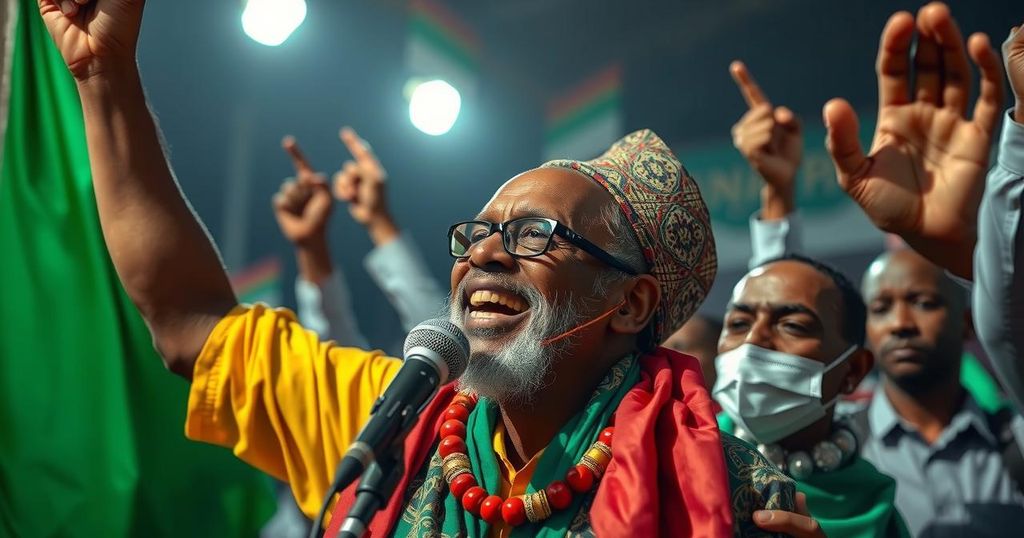Global news
ABD, ABDIRAHMAN MOHAMED ABDULLAHI, ABDULLAHI, AFRICA, AL-SHABAAB, AP, COMMISSION, DIPLOMACY, DIPLOMATIC RELATIONS, DJIBOUTI, ETHIOPIA, HASSAN ALI KHAIRE, INDIAN OCEAN, ISMAIL OMAR GUELLEH, MOGADISHU, MOHAMED HUSEIN GAAS, MUSE BIHI ABDI, RAAD PEACE RESEARCH INSTITUTE, REGIONAL COOPERATION, REGIONAL SECURITY, SOMALIA, SOMALILAND, THE ASSOCIATED PRESS, WADDANI PARTY
Jamal Walker
0 Comments
Somaliland Opposition Leader Abdirahman Abdullahi Wins Presidential Election
Abdirahman Mohamed Abdullahi, the opposition leader of the Waddani Party, has won Somaliland’s presidential election with over 50% of the vote. He aims to implement democratic reforms and tackle youth unemployment, succeeding President Muse Bihi Abdi. The election highlights the stable political environment of Somaliland, which has sought economic benefits from a recent agreement with Ethiopia, generating both hope and criticism regarding regional relations.
In a significant electoral victory in Somaliland, Abdirahman Mohamed Abdullahi, the opposition leader of the Waddani Party, has been declared the winner of last week’s presidential election. Abdullahi, receiving over 50% of the votes, campaigned on a platform advocating for democratic reforms and economic revitalization, particularly aimed at addressing youth unemployment. His victory marks a noteworthy shift in Somaliland’s political landscape, where he will succeed President Muse Bihi Abdi of the Kulmiye Party, who garnered just over 30% of the votes while seeking a second term. The election, which faced delays since 2022 due to funding issues and various logistical challenges, underscores the dynamic political context within Somaliland—an autonomous region that declared independence from Somalia in 1991. Despite the longstanding absence of international recognition, Somaliland has established its own government and security frameworks, standing in stark contrast to the ongoing chaos in Somalia. Somaliland’s recent agreement with neighboring Ethiopia to facilitate access to the Indian Ocean has sparked political tensions with Somalia. Critics, including members of the Waddani Party, expressed concerns regarding the lack of immediate economic benefits arising from this Memorandum of Understanding (MoU). They accuse the government of negotiating the agreement in secrecy, raising questions about its implications for trade and regional support. The victory of the opposition has elicited hopeful responses from Somali leaders, who anticipate improved relations with Somaliland in the wake of this change in leadership. Former Prime Minister Hassan Ali Khaire expressed optimism for a trajectory of peace and development under the new administration, emphasizing the unity of the Somali people. Meanwhile, Djibouti’s President Ismail Omar Guelleh extended his congratulations to the newly elected president.
Somaliland, a region that declared independence from Somalia in 1991, operates its own government despite lacking international recognition. Over the years, Somaliland has developed a stable political environment while Somalia continues to grapple with security challenges. The recent presidential election signifies a pivotal moment in Somaliland’s governance, as the newly elected opposition leader seeks to address economic and social issues, particularly concerning youth unemployment and regional cooperation with Ethiopia.
The election of Abdirahman Mohamed Abdullahi as president of Somaliland represents a crucial development in the region’s quest for democratic governance and socio-economic improvement. The opposition’s commitment to reform promises significant changes amidst an evolving political landscape marked by regional tensions and economic aspirations. The hope for improved relations with Somalia adds another layer of significance to this electoral outcome, highlighting the potential for peace and collaboration within the Somali community.
Original Source: www.seattletimes.com




Post Comment